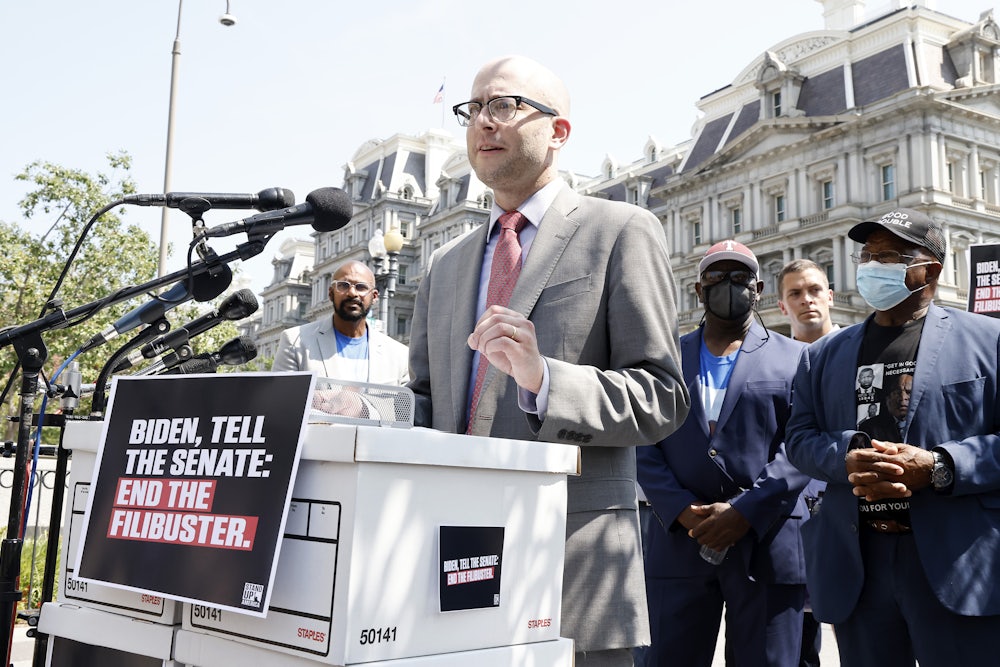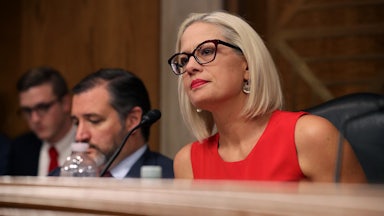Thanks to the intransigence of Joe Manchin and Kyrsten Sinema on the legislative filibuster, any notion of Congress making a sustained push for democratic reforms is functionally dead. Voting rights advocates had hoped Democrats would go into the midterm elections having passed a comprehensive reform package, or at least an uncontroversial update to the 1965 Voting Rights Act, that might turn the tide against the voting restrictions being implemented in Republican states.
Instead, it’s likely Democrats will end the year having passed nothing, save for, perhaps, a reform of the Electoral Count Act to prevent Donald Trump from utilizing Congress to overturn the next election—if even that. Making matters worse, we’ve every reason to expect Democrats will lose big on Election Day this November, although Democratic state governments have managed to hold their own in a redistricting process that might have compounded their losses. But even these successes have been dismaying—grim reminders of just how much the outcomes of our elections can depend on lawsuits and finagling over how district maps are carved up.
This is one of the central challenges and paradoxes of the democratic reform effort: We depend on Congress to reform the means by which we send people to Congress. Malapportionment in the Senate and gerrymandering have rightly troubled reform advocates and commentators for some time now. But the design of the House has attracted far less attention. Fix Our House, a new group launching this month, is trying to change that through advocacy for a reform that would wholly transform American politics: proportional representation.
“The basic theory of Fix Our House is that our system is broken and that it’s only going to get worse,” Eli Zupnick, co-founder of Fix Our House and former spokesperson for the anti-filibuster Fix Our Senate campaign, says. “There are major structural problems with a two-party system where one party simply rejects democracy. And the only way it’s going to change is if we make the structural changes to pull us back from the brink.”
Proportional representation could disrupt the two-party duopoly by making basic changes to the way House elections work. Proportional systems vary widely in design and specifics, but the underlying idea is a simple one. Currently, each House district elects one representative—whoever wins at least a plurality of the vote. If Party A’s candidate wins 50 percent of the vote, Party B wins 40 percent of the vote, and some third Party C wins 10 percent of the vote, Party A’s candidate goes to Congress while Party B and Party C’s voters aren’t represented at all. In a proportional system, each district would elect multiple representatives, with each party getting a share of them equal to their share of the vote, provided, perhaps, they meet some threshold level of support—maybe 10 percent of the vote. In this case, voters from Party A, B, and C would all send people to Washington—5, 4, and 1 representatives respectively in a 10-member district, for instance. This would grant Party A its due advantage while also granting all the district’s voters a seat at the table they wouldn’t have had otherwise.
This would functionally put an end to solid-seeming red and blue districts rendered “safe” by ideological polarization, geographic separation, and gerrymandering. Our most Republican districts would likely send at least a few Democrats to Congress and vice versa, making votes cast everywhere truly meaningful. What’s more, proportional representation would be a boon to voters in small parties like the Greens and Libertarians—so much so, in fact, that dissident left-wing Democrats and centrist Republicans would have good reason to strike out on their own and create new parties essentially guaranteed representation in Congress.
“Having a multiparty system in which progressives would be able to have our own Democratic Party and moderate Democrats would be able to have their own Democratic Party would strengthen and cohere the left and make the left a bit more disciplined,” Waleed Shahid, spokesperson for Justice Democrats and a member of Fix Our House’s advisory board, says. “Most Democratic voters can’t really tell the difference between Joe Biden and Bernie Sanders. But if you attach party labels to them, it would help make some of these choices more clear and less about personalities.”
Proportional systems are extremely common abroad. According to the Electoral Reform Society, a reform group in the U.K., all but three countries in Europe used some form of proportional representation as of 2018. That’s not to say they’re problem-free—coalition politics in multiparty systems can be fraught and difficult for ordinary voters to parse, among other issues. But relative to the status quo here, it’s not difficult to see how bargaining between smaller, more ideologically defined parties might break the congressional logjam on issues—climate change, civil liberties, and foreign policy interventionism, for instance—where cross-party coalitions are suppressed or frustrated by zero-sum, duopolistic politics.
Critically, none of this would require a constitutional amendment. Article I grants Congress broad latitude to determine how congressional elections are conducted. An existing proportional representation bill, the Fair Representation Act, would simply combine our current single-member districts into new multimember districts, with representatives chosen by ranked-choice voting—another reform allowing voters to rank candidates on ballots. The only technical hitch is that Congress would also have to repeal a 1967 law mandating single-member districts for all states with at least two allotted seats—a measure that was passed in part because some states had used multimember districts to dilute Black votes. Today, the single-member status quo benefits a party that’s utilized its power in Washington and at the state level to disenfranchise minority voters. Proportional representation would see defenders of the right to vote elected in all parts of the country, not just Democratic strongholds.
Needless to say, there’s zero chance proportional representation gets off the ground in Congress anytime in the very near future—Fix Our House is playing the long game. Even so, one of the challenges proportional representation advocates will face moving forward, beyond the composition of this particular Congress, is that a potential breakup of the party system isn’t going to seem terribly attractive to many or most party leaders even within the Democratic Party, as putatively as committed as it is to democratic reform.
Still, political scientist Lee Drutman, co-founder of Fix Our House and a longtime proportional representation advocate, is optimistic that the degradation of the federal system will force the issue. “If the system of voting is not really helping them to advance their priorities, and it’s also contributing to a binary zero-sum dynamic that’s destroying the very foundation of our democracy—which is the legitimacy of elections and a shared sense that we are all part of the same nation—is the Democratic Party as an entity really worth preserving?” he asks. “Ultimately I think most people who are in politics get into politics because they have some idea that they want to be part of something bigger. They care about policy, and they recognize that the status quo is untenable. And they can still get elected in a different system. It doesn’t force them out of politics. It just gives them an opportunity to be a more important piece of a smaller party.”
UC Berkeley’s Charlotte Hill, another Fix Our House co-founder, agrees. “There’s that famous AOC quote that she shouldn’t be part of the same Democratic Party as a Joe Manchin or other folks to her right,” she says. “I think we certainly see that on the right, as well, although at this point, so many of the more moderate Republicans have proactively retired or been defeated. So there are people who would be able to gain power in a new system.”
That would include Never Trump Republicans like Miles Taylor, another Fix Our House advisory board member, who thinks a broad ideological coalition on proportional representation can be forged. “If this was happening 10 years ago, I would’ve been in the camp that said, this is utopian political fantasy and I have no interest in getting involved,” he says. “But so much has changed in the last decade that whether we’re on the left or the right or the center—we’re seeing these same forces in our politics, the forces of extremism, and the resulting gridlock and a deep partisan animus. All these strange bedfellows are coming together and saying, ‘Look, regardless of what our ideology is, we agree that the system needs to be more competitive so that it reflects a diversity of viewpoints better than it does now.’”
That may be the case, and ordinary voters may agree. But getting them to embrace proportional representation as a solution will take concerted efforts to make the idea familiar and accessible. Beyond the outreach to politicians and groups in Washington that Fix Our House has planned, Hill believes that advocates can take a page from a successful local campaign for proportional representation in Albany, California, in 2020.
“I spoke with one of the lead organizers who was going door to door, and he said, if we try to tell people that they should support proportional representation, their eyes would glaze over,” she says. “But if we started by asking, ‘Do you feel that city government is working for you?’ people would have opinions. And usually the answer was, ‘No,’ or ‘I don’t feel that my perspective is all that represented.’ And then we could say, ‘Well, part of that is because of the actual way that we count votes and translate them into power.’”
“Once people have that mindset shift where they switch from thinking of representation as this thing that the majority wins and gets to impose on the country,” she continues, “they start seeing different possibilities—everyone gets some voice, we’re hashing things out at a table and trying to come to policies that are broadly acceptable. Once you see that as an option, you can’t unsee it.”
For all the talk in the air about “saving” American democracy, ideas like proportional representation illustrate how far the status quo is from a system that would truly reflect the democratic values we espouse; single-member districts that elect their representatives by pluralities are simply incompatible with the concept of majority rule and the intuition that all votes should matter. And even if proportional representation seems a long way off, advancing the idea will surely deepen our conversations in the here and now about what democracy can and should mean—that’s more than reason enough to root for Fix Our House’s campaign.










